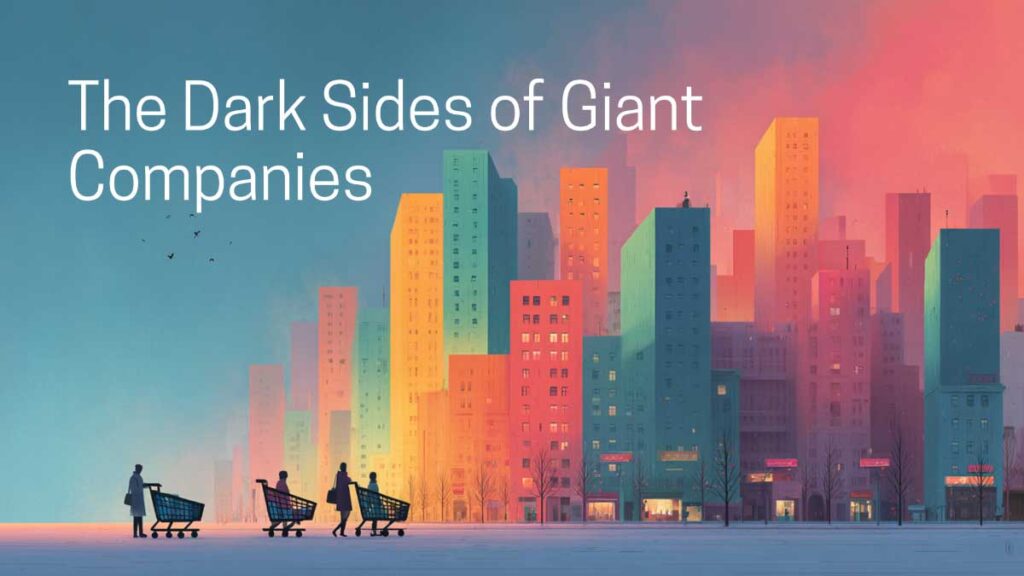Big brands make life feel easy, fast shipping, one-click checkouts, free trials everywhere. I’m not anti-convenience. I just keep noticing little moments where the convenience quietly costs more than it looks, surprise fees, confusing cancel pages, and vague “planet friendly” promises with no numbers. This is my plain-English guide to the dark sides of giant companies, with real examples, how it shows up in daily life, and simple things I do to shop smarter.
What “dark sides of giant companies” really means
Think of a company like a machine built to grow. Growth can mean cool products and good jobs. The dark side is what happens when the scoreboard rewards numbers more than people, more than transparency, more than long-term health. That can look like underpaid labor deep in a supply chain, pollution that gets counted as someone else’s problem, exclusive deals that squeeze out rivals, or tiny design tricks that push you into subscriptions you did not plan to buy.
I feel it most at checkout. A box pre-checked. A 7-day trial that takes 5 clicks and a 12-minute chat queue to cancel. A delivery date that quietly moves after I pay. Small frictions, repeated at scale, add up.
The big four problems with big corporations
Labor practices, the human costs behind convenience
- Risks and low pay can hide three or four layers down the supply chain.
- Contractors and temp workers often miss benefits and basic protections.
- What you may notice, super-fast shipping that feels “free,” but only because someone else is racing a clock.
From my cart: I compared two basic tees. One listed fabric, factory location, and care details. The other gave almost nothing. I bought the first. After five washes it kept its shape, fewer pills, and felt like a fairer choice.
Curious how shopper choices move brands? Read how conscious consumers are driving sustainable fashion.
Environmental impact, when low prices shift costs to communities
- Extraction, manufacturing, and shipping burn energy and water, then leave waste behind.
- Green claims can be fuzzy, “100 percent planet friendly” with no figures or third-party proof.
- What you may notice, low prices for you, higher cleanup costs somewhere else.
Small switch that helped: I moved pantry orders to slower shipping. Delivery went from 2 days to 4. I got a 1 USD credit and felt better about not forcing a rush truck across town for cereal.
Want vetted alternatives you can actually shop? Browse sustainable fashion brands we recommend.
Monopolistic behavior, how big corporations shrink your choices
- Default deals, exclusive partnerships, and buyouts keep smaller players off your radar. See the U.S. Department of Justice on Google’s search defaults and remedies: DOJ press release.
- Once a platform controls the shelf, it can set the rules and the fees.
- What you may notice, fewer options, slower innovation, and a higher total cost over time.
Tiny tweak, big effect: I changed my phone’s default browser and search. Within a week I started finding smaller shops I had never seen before.
Consumer trust and dark patterns, tiny design choices that move billions
- Confusing cancel flows, hidden fees, and privacy settings that take a scavenger hunt to find. The FTC sued Amazon over Prime enrollment and cancellation flows, details here: FTC press release and case page.
- Data gets shared more than you expect. Facebook’s penalties were historic, see the FTC’s 5 billion dollar order: FTC press release and the 725 million dollar class settlement site: facebookuserprivacysettlement.com.
- What you may notice, “free” is not free, you pay with time, attention, and data.
My rule now: Before any free trial, I google “How to cancel [brand].” If cancel takes more than a couple clicks or requires a phone call, I skip it.
Real world snapshots, one line lessons
| Company or Case | What happened | One line lesson | Source |
|---|---|---|---|
| Boeing, 737 MAX and later quality lapses | Safety and quality oversight failed under production pressure | When schedule wins, safety loses | NTSB Lion Air & Ethiopian investigations, Alaska 1282 incident PDF, NTSB Alaska 1282 page |
| Google, search defaults | Exclusive default deals helped entrench power | The default is the decision for most people | DOJ remedies press release |
| Amazon, Prime enrollment UX | Easy sign up, confusing cancel for many | Small UX choices can move billions | FTC press release, FTC case page |
| Meta, data sharing fallout | Record penalties and settlements over data use | If data is valuable, it will be pushed to its limits | FTC 5B order, 725M class settlement |
| Johnson & Johnson, talc litigation | Years of legal maneuvering over product safety claims | Legal strategy can outlast public trust | Reuters, court rejects J&J talc plan, Apr 1, 2025 |
| Wells Fargo, fake accounts era | Incentives drove harmful internal behavior | Bad goals create bad outcomes | CFPB 3.7B action summary, Consent order hub |
| McKinsey, opioid consulting | Settlement for advising on risky sales tactics | Influence without visibility is still power | Massachusetts AG release, New York AG release |
| Tesla, driver assist scrutiny | Recalls and probes on misuse and safety | Design for how people actually behave | NHTSA recall 23V-838 PDF, NHTSA Recall Query RQ24-009 PDF |
| Volkswagen, Dieselgate | Software cheated emissions tests | Great engineering can be used the wrong way | DOJ settlement overview, EPA consent decree PDF |
| Global supply chains, Xinjiang risk | Forced labor concerns across inputs | Distance hides human cost | U.S. Dept. of Labor brief, DHS UFLPA strategy update, 2025 PDF, Reuters testing report |
| Nestlé, bottled water rights | Long fights over public water use | Private extraction invites long bills for others | LA Times on May 8, 2025 ruling, AP recap of regulator order |
How these problems hit your daily life
- Prices seem low, total cost creeps up. Add-on fees, rush shipping, and auto-renewals turn into a larger annual spend than you planned.
- Privacy leaks into your feed. One search, and your social apps feel like a store window for a week.
- Choice narrows quietly. When giants own the shelf and the search box, the best small brand for you might never appear.
- Quality becomes uneven. Glossy ads, thinner materials, and a return policy that makes quitting harder than buying.
Practical takeaways that actually help
30-second dark-pattern check
- Boxes: Anything pre-checked, insurance, add-ons, “priority handling.”
- Cancel: Is the cancel link visible from the account page.
- Total: Is the full price crystal clear, item, tax, shipping, fees.
- Trials: Does it show the renewal price in USD and the exact date.
- Help: Is there chat or a phone line for cancellations.
Before you buy
- Scan the checkout flow. Uncheck what you don’t need. If a fee reappears at step three, that’s a sign.
- Search the brand plus “labor” or “environment.” Five minutes on page one of results can surface real reports.
- Check a third-party signal. Good On You for apparel, EWG for select household items, Energy Star for appliances, FSC for paper and wood.
- Compare cancel policy. If cancel is harder than sign-up, walk away.
While you shop
- Favor clear materials and repair info. I pick the kettle that lists the replacement gasket and model number. It saved me 18 USD last winter.
- Choose slower shipping when you can. Less rush pressure, sometimes a small store credit.
- Support smaller or certified options. Fair Trade, B Corp, FSC, USDA Organic, where they actually fit.
After you buy
- Audit subscriptions. I add two reminders, day 10 and day 2 before renewal, with the price in the title, “Cancel music app, 10.99 USD.”
- Leave honest reviews. Real details help the next shopper and nudge brands to fix issues.
- Return what disappoints you. Keeping low-quality items out of guilt rewards bad decisions.
Ready to tighten your habits without spending hours? Try five quick tips to be a more conscious consumer.
FAQ, quick answers people actually search
What is a dark pattern?
A design choice that nudges you into something you did not plan to do, hidden fees, pre checked boxes, or a cancel path that takes a maze. See the FTC’s language in its Amazon Prime case.
How do I spot greenwashing fast?
Look for specifics, percent recycled content, third party certifications, and dated targets. Vague “eco” claims with no numbers are a warning sign.
Do boycotts work?
Sometimes. Public reviews, asking clear questions on brand posts, and choosing verified alternatives can move faster.
Is there a simple rule for defaults?
Change them. New browser, new search, opt out of auto renew, uncheck everything at checkout. For search defaults, the DOJ’s Google case is a reminder that defaults matter: DOJ remedies press release.
What if smaller brands cost more?
Start small. Swap one item a month, socks, coffee, dish soap. Track quality for 90 days. Keep what proves itself.
Does paying more always mean ethical?
No. Look for proof, materials, audits, certifications, repair parts, and service policies.
Skim-friendly summary
- Dark sides means harms created by scale, labor, environment, monopoly power, and sneaky design.
- You feel it through surprise fees, privacy creep, fewer choices, and uneven quality.
- Do this uncheck pre-selected boxes, search the brand’s labor or environmental record, favor clear materials, set renewal reminders, and try one new small brand each month.






